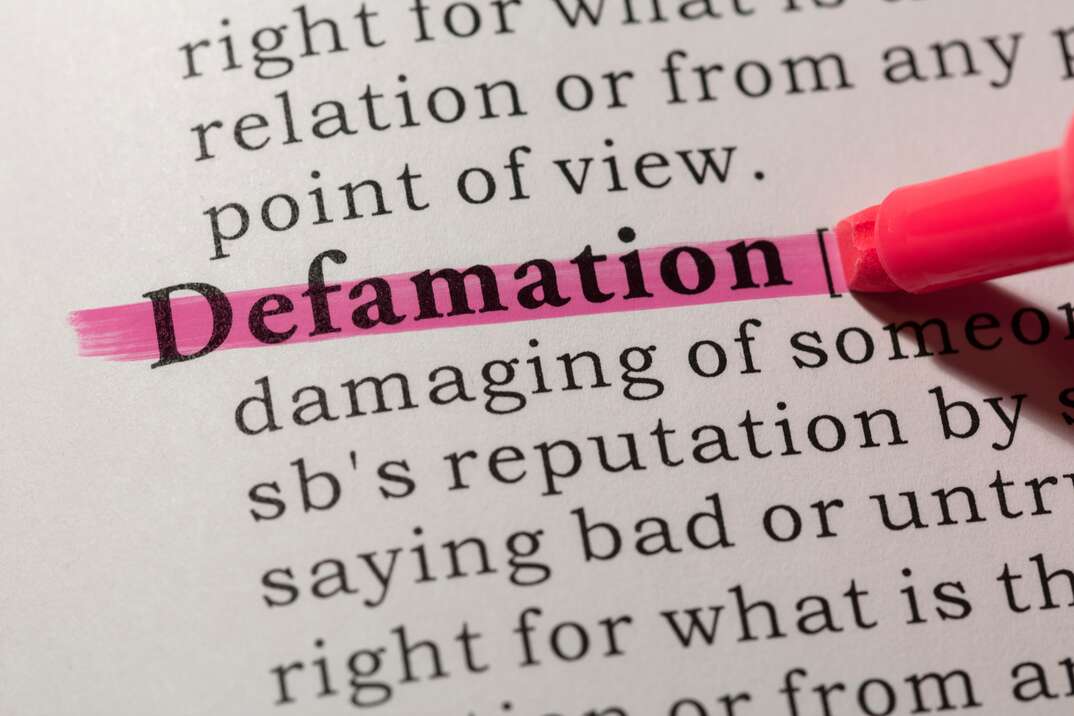- AppliancesElectriciansHVACLandscapingLocksmithPest ControlPlumbingRenovationRoofingT V RepairAll Home Improvement
- Car AccidentClass ActionCorporate LawCriminal DefenseDivorce LawEmployment LawFamily LawFinancial LawLegal AidMedical Injury LawyersMedical MalpracticeReal Estate LawWater Fire RestorationAll Legal
- InvestmentRetirementAll Finance
- Animal InsuranceAutoGeneral InsuranceHealth PolicyHome RentersAll Insurance
- DentalHealth SpecialistsAll Medical
- Animal CareVeterinaryAll Pets
- Auto GlassTowingAll Automotive
What is Defamation of Character?

If you’ve found out that someone is telling lies about you, you may be tempted to take action.
Can you sue for defamation? Understanding what defamation of character is — and what it isn’t — can help you make a decision about your legal options.
Cornell Law School’s Legal Information Institute defines defamation as “a statement that injures a third party’s reputation.” Exact definitions under the law can vary as each state has different laws, but the statement generally has to meet three standards to be defamatory. It must:
- Be a false statement made to a third party
- Be presented as fact
- Cause reputational damage
What Are Libel and Slander?
Libel and slander are often confused with defamation. In essence, these are the ways a defamatory statement can be made. False statements that are made orally, or spoken, are known as slander. If the false statement is made in writing, this is libel.
Suing for Defamation of Character
If you believe someone has made a defamatory claim against you, you can pursue a civil claim in court. There’s the opportunity to get monetary compensation for the harm done to your reputation. To win, you must prove that:
- A false statement of fact was made
- It was heard by a third party
- The person who stated it was negligent or acted with malice
- The statement wasn’t privileged
- You experienced harm
The first point is important. The person must be presenting the statement as fact. Opinion and parody don’t count as defamation. The statement must also be false; the truth is always a defense against defamation.
There are also some occasions when a statement is considered privileged. Privilege is intended to protect a person’s ability to speak freely when it’s important to do so. Examples of privileged speech include statements made during court proceedings and when legislators are making laws.
Private figures must show that the person making the statement was negligent, meaning that a reasonable person would have taken steps to figure out the truth. Public figures must be able to prove that the person acted with malice by knowingly making a false statement or acting with reckless disregard.
In most cases, you must also show that you were harmed by the statement. However, there are some cases when a statement is presumed to damage a person’s reputation without needing to prove harm. This is called defamation per se and can include statements that a person has:
- Committed adultery
- A contagious disease
- Committed a crime
- Engaged in behavior incompatible with their business or profession
When suing for defamation, you may be awarded financial compensation. This can replace actual financial losses, such as lost earnings or expenses for repairing your reputation. You can also get compensation for non-financial losses such as emotional distress and mental anguish. In rare cases, a court may award punitive damages to deter similar conduct in the future, but this is rare.
More Related Articles:
- When Do You Need a Lawyer? Determine If You Need to Hire an Attorney
- What Is a Class-Action Lawsuit?
- What Is a Misdemeanor?
- What to Do After a Car Accident
- What Is Power of Attorney?
What Are Some Examples of Defamation of Character?
There are plenty of real-world examples of defamation lawsuits. One case that wasn’t successful was when comedian John Oliver was sued by coal baron Robert Murray. This was a case when the statements made were considered to be a form of parody, as they were too ridiculous to be believed.
Actress Katie Holmes settled her suit against Star magazine, which published an article stating she was a drug addict. The magazine published an apology and made a substantial donation to charity as part of the settlement.
Actress Rebel Wilson also sued a publishing company over tabloid claims that she lied about her age, name and childhood. Although she won the case, this was later overturned on appeal as she couldn’t prove that she’d experienced financial harm.
Elocal Editorial Content is for educational and entertainment purposes only. The information provided on this site is not legal advice, and no attorney-client or confidential relationship is formed by use of the Editorial Content. We are not a law firm or a substitute for an attorney or law firm. We cannot provide advice, explanation, opinion, or recommendation about possible legal rights, remedies, defenses, options or strategies. The opinions, beliefs and viewpoints expressed by the eLocal Editorial Team and other third-party content providers do not necessarily reflect the opinions, beliefs and viewpoints of eLocal or its affiliate companies. Use of the Blog is subject to the
Website Terms and Conditions.The eLocal Editorial Team operates independently of eLocal USA's marketing and sales decisions.

